Self-Assessment: Reflective Journal on Emotional Intelligence
VerifiedAdded on 2023/06/15
|6
|983
|190
Journal and Reflective Writing
AI Summary
This reflective journal delves into the results of an emotional intelligence self-assessment, examining self-awareness, self-management, social awareness, and relationship management. The author reflects on the accuracy of the results, lessons learned, and relevant theoretical concepts such as teamwork, empathy, and leadership. The journal further explores how these insights can be applied to improve professional practice, focusing on enhancing team skills, understanding customer needs, managing emotions, and adapting to change. The self-assessment is a tool that helps the author identify areas for personal and professional development, paving the way for more effective interactions and leadership capabilities in the future.
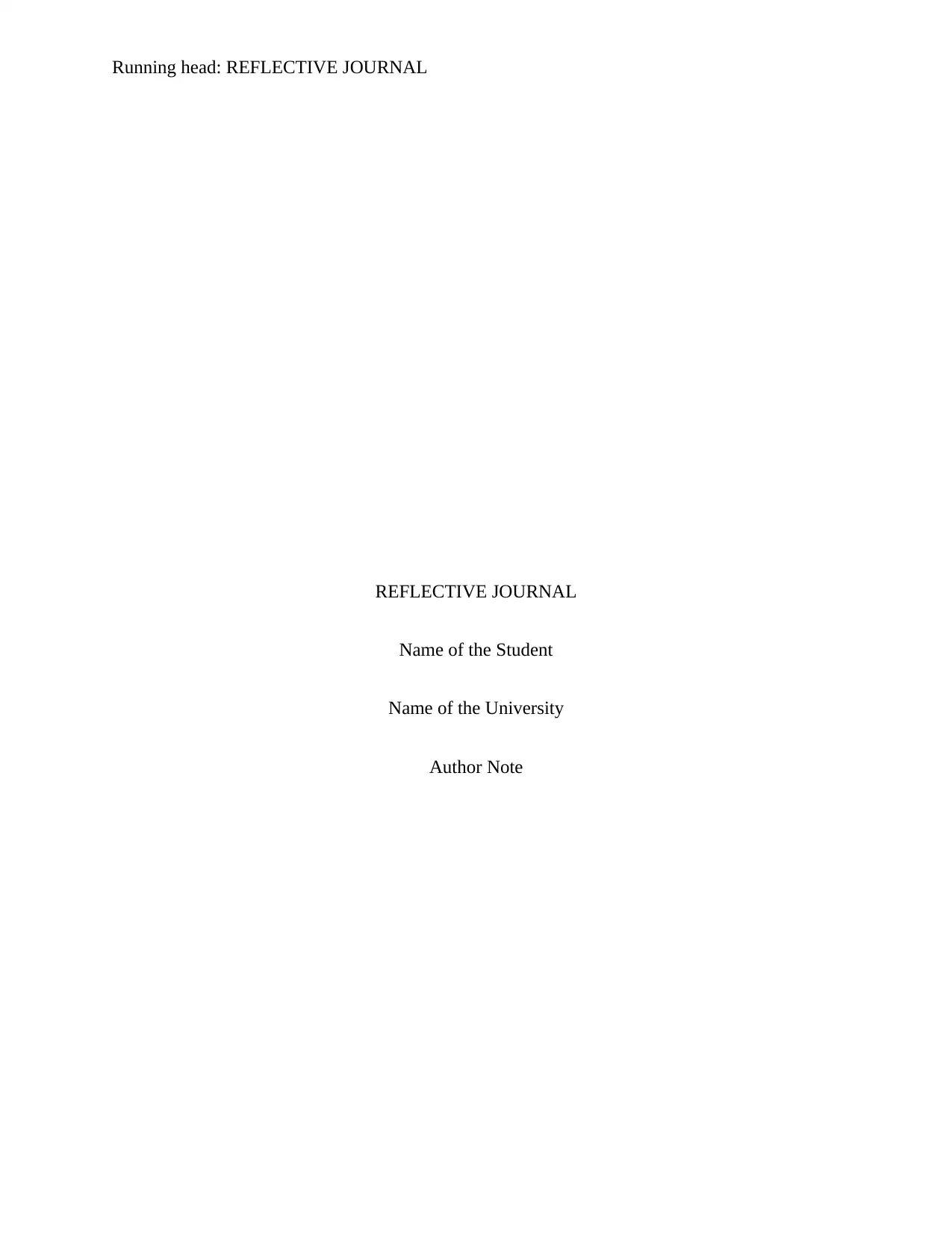
Running head: REFLECTIVE JOURNAL
REFLECTIVE JOURNAL
Name of the Student
Name of the University
Author Note
REFLECTIVE JOURNAL
Name of the Student
Name of the University
Author Note
Paraphrase This Document
Need a fresh take? Get an instant paraphrase of this document with our AI Paraphraser
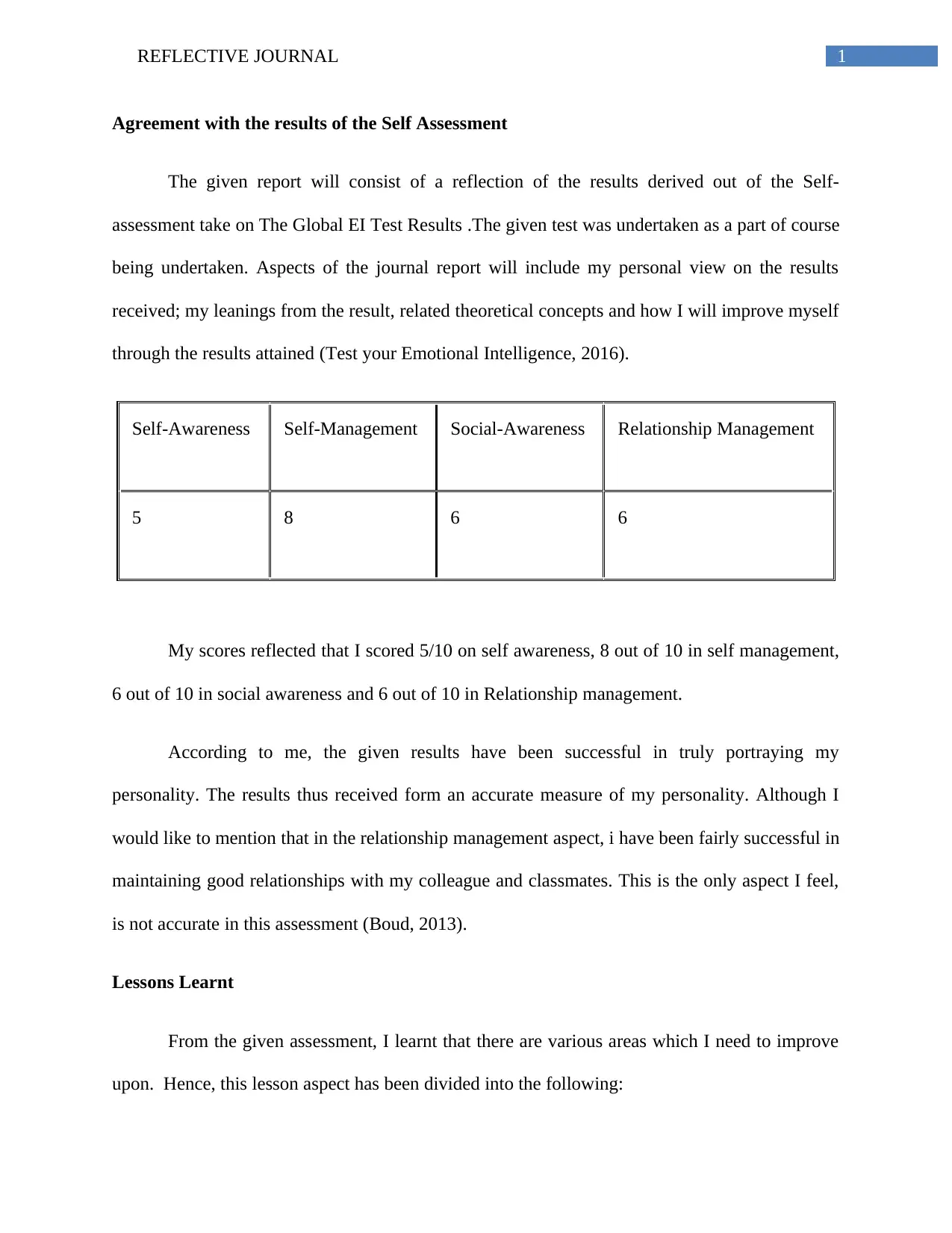
1REFLECTIVE JOURNAL
Agreement with the results of the Self Assessment
The given report will consist of a reflection of the results derived out of the Self-
assessment take on The Global EI Test Results .The given test was undertaken as a part of course
being undertaken. Aspects of the journal report will include my personal view on the results
received; my leanings from the result, related theoretical concepts and how I will improve myself
through the results attained (Test your Emotional Intelligence, 2016).
Self-Awareness Self-Management Social-Awareness Relationship Management
5 8 6 6
My scores reflected that I scored 5/10 on self awareness, 8 out of 10 in self management,
6 out of 10 in social awareness and 6 out of 10 in Relationship management.
According to me, the given results have been successful in truly portraying my
personality. The results thus received form an accurate measure of my personality. Although I
would like to mention that in the relationship management aspect, i have been fairly successful in
maintaining good relationships with my colleague and classmates. This is the only aspect I feel,
is not accurate in this assessment (Boud, 2013).
Lessons Learnt
From the given assessment, I learnt that there are various areas which I need to improve
upon. Hence, this lesson aspect has been divided into the following:
Agreement with the results of the Self Assessment
The given report will consist of a reflection of the results derived out of the Self-
assessment take on The Global EI Test Results .The given test was undertaken as a part of course
being undertaken. Aspects of the journal report will include my personal view on the results
received; my leanings from the result, related theoretical concepts and how I will improve myself
through the results attained (Test your Emotional Intelligence, 2016).
Self-Awareness Self-Management Social-Awareness Relationship Management
5 8 6 6
My scores reflected that I scored 5/10 on self awareness, 8 out of 10 in self management,
6 out of 10 in social awareness and 6 out of 10 in Relationship management.
According to me, the given results have been successful in truly portraying my
personality. The results thus received form an accurate measure of my personality. Although I
would like to mention that in the relationship management aspect, i have been fairly successful in
maintaining good relationships with my colleague and classmates. This is the only aspect I feel,
is not accurate in this assessment (Boud, 2013).
Lessons Learnt
From the given assessment, I learnt that there are various areas which I need to improve
upon. Hence, this lesson aspect has been divided into the following:
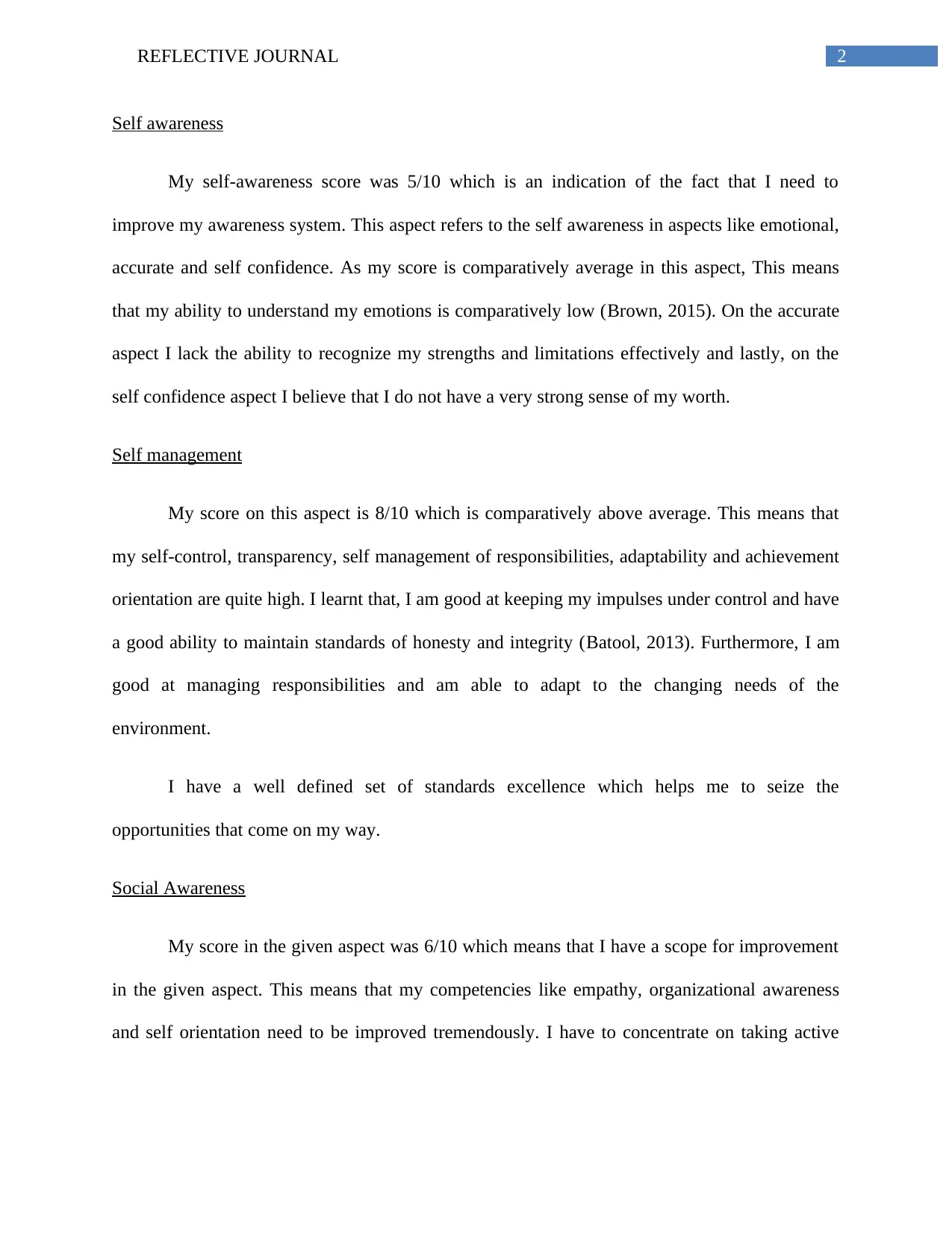
2REFLECTIVE JOURNAL
Self awareness
My self-awareness score was 5/10 which is an indication of the fact that I need to
improve my awareness system. This aspect refers to the self awareness in aspects like emotional,
accurate and self confidence. As my score is comparatively average in this aspect, This means
that my ability to understand my emotions is comparatively low (Brown, 2015). On the accurate
aspect I lack the ability to recognize my strengths and limitations effectively and lastly, on the
self confidence aspect I believe that I do not have a very strong sense of my worth.
Self management
My score on this aspect is 8/10 which is comparatively above average. This means that
my self-control, transparency, self management of responsibilities, adaptability and achievement
orientation are quite high. I learnt that, I am good at keeping my impulses under control and have
a good ability to maintain standards of honesty and integrity (Batool, 2013). Furthermore, I am
good at managing responsibilities and am able to adapt to the changing needs of the
environment.
I have a well defined set of standards excellence which helps me to seize the
opportunities that come on my way.
Social Awareness
My score in the given aspect was 6/10 which means that I have a scope for improvement
in the given aspect. This means that my competencies like empathy, organizational awareness
and self orientation need to be improved tremendously. I have to concentrate on taking active
Self awareness
My self-awareness score was 5/10 which is an indication of the fact that I need to
improve my awareness system. This aspect refers to the self awareness in aspects like emotional,
accurate and self confidence. As my score is comparatively average in this aspect, This means
that my ability to understand my emotions is comparatively low (Brown, 2015). On the accurate
aspect I lack the ability to recognize my strengths and limitations effectively and lastly, on the
self confidence aspect I believe that I do not have a very strong sense of my worth.
Self management
My score on this aspect is 8/10 which is comparatively above average. This means that
my self-control, transparency, self management of responsibilities, adaptability and achievement
orientation are quite high. I learnt that, I am good at keeping my impulses under control and have
a good ability to maintain standards of honesty and integrity (Batool, 2013). Furthermore, I am
good at managing responsibilities and am able to adapt to the changing needs of the
environment.
I have a well defined set of standards excellence which helps me to seize the
opportunities that come on my way.
Social Awareness
My score in the given aspect was 6/10 which means that I have a scope for improvement
in the given aspect. This means that my competencies like empathy, organizational awareness
and self orientation need to be improved tremendously. I have to concentrate on taking active
⊘ This is a preview!⊘
Do you want full access?
Subscribe today to unlock all pages.

Trusted by 1+ million students worldwide
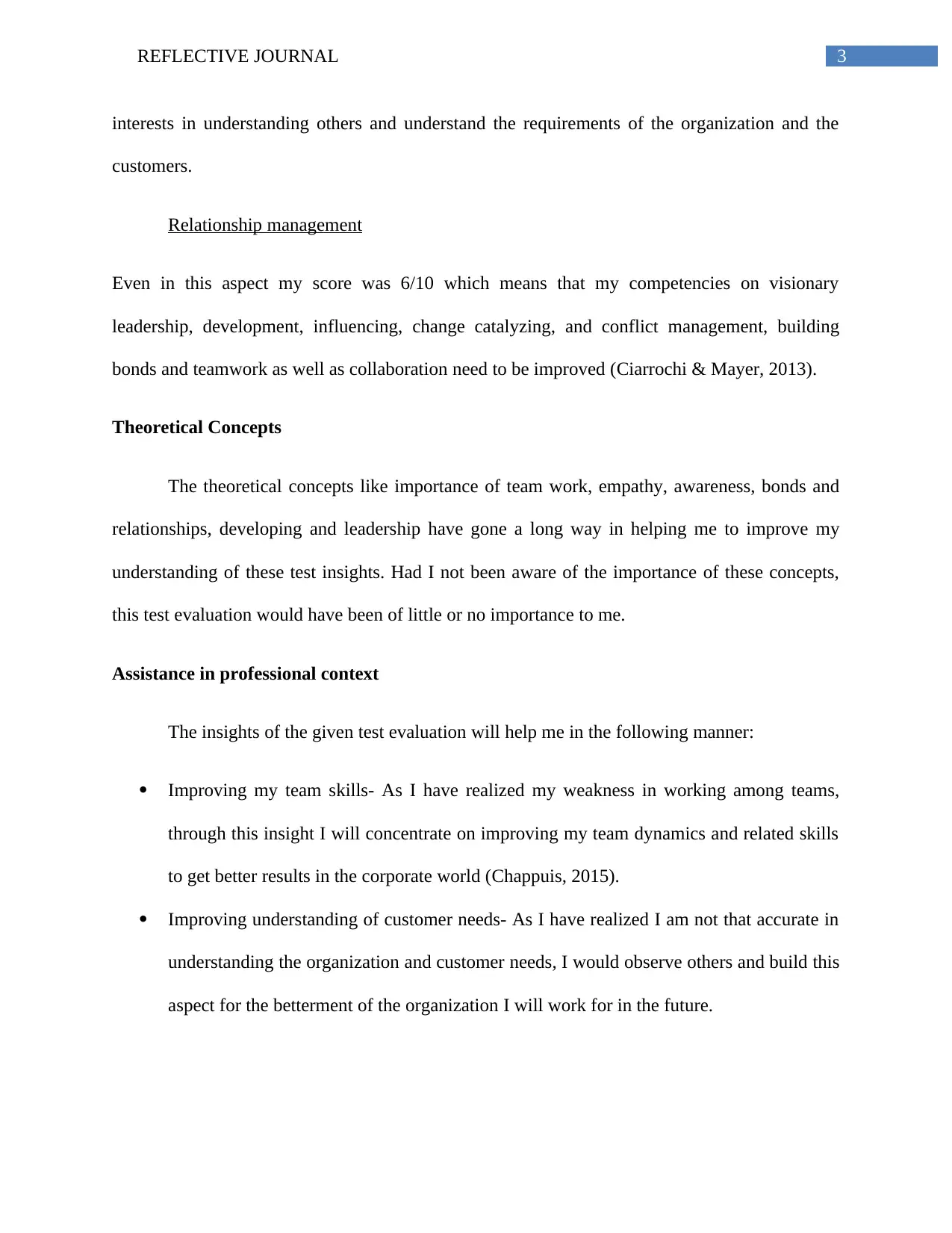
3REFLECTIVE JOURNAL
interests in understanding others and understand the requirements of the organization and the
customers.
Relationship management
Even in this aspect my score was 6/10 which means that my competencies on visionary
leadership, development, influencing, change catalyzing, and conflict management, building
bonds and teamwork as well as collaboration need to be improved (Ciarrochi & Mayer, 2013).
Theoretical Concepts
The theoretical concepts like importance of team work, empathy, awareness, bonds and
relationships, developing and leadership have gone a long way in helping me to improve my
understanding of these test insights. Had I not been aware of the importance of these concepts,
this test evaluation would have been of little or no importance to me.
Assistance in professional context
The insights of the given test evaluation will help me in the following manner:
Improving my team skills- As I have realized my weakness in working among teams,
through this insight I will concentrate on improving my team dynamics and related skills
to get better results in the corporate world (Chappuis, 2015).
Improving understanding of customer needs- As I have realized I am not that accurate in
understanding the organization and customer needs, I would observe others and build this
aspect for the betterment of the organization I will work for in the future.
interests in understanding others and understand the requirements of the organization and the
customers.
Relationship management
Even in this aspect my score was 6/10 which means that my competencies on visionary
leadership, development, influencing, change catalyzing, and conflict management, building
bonds and teamwork as well as collaboration need to be improved (Ciarrochi & Mayer, 2013).
Theoretical Concepts
The theoretical concepts like importance of team work, empathy, awareness, bonds and
relationships, developing and leadership have gone a long way in helping me to improve my
understanding of these test insights. Had I not been aware of the importance of these concepts,
this test evaluation would have been of little or no importance to me.
Assistance in professional context
The insights of the given test evaluation will help me in the following manner:
Improving my team skills- As I have realized my weakness in working among teams,
through this insight I will concentrate on improving my team dynamics and related skills
to get better results in the corporate world (Chappuis, 2015).
Improving understanding of customer needs- As I have realized I am not that accurate in
understanding the organization and customer needs, I would observe others and build this
aspect for the betterment of the organization I will work for in the future.
Paraphrase This Document
Need a fresh take? Get an instant paraphrase of this document with our AI Paraphraser
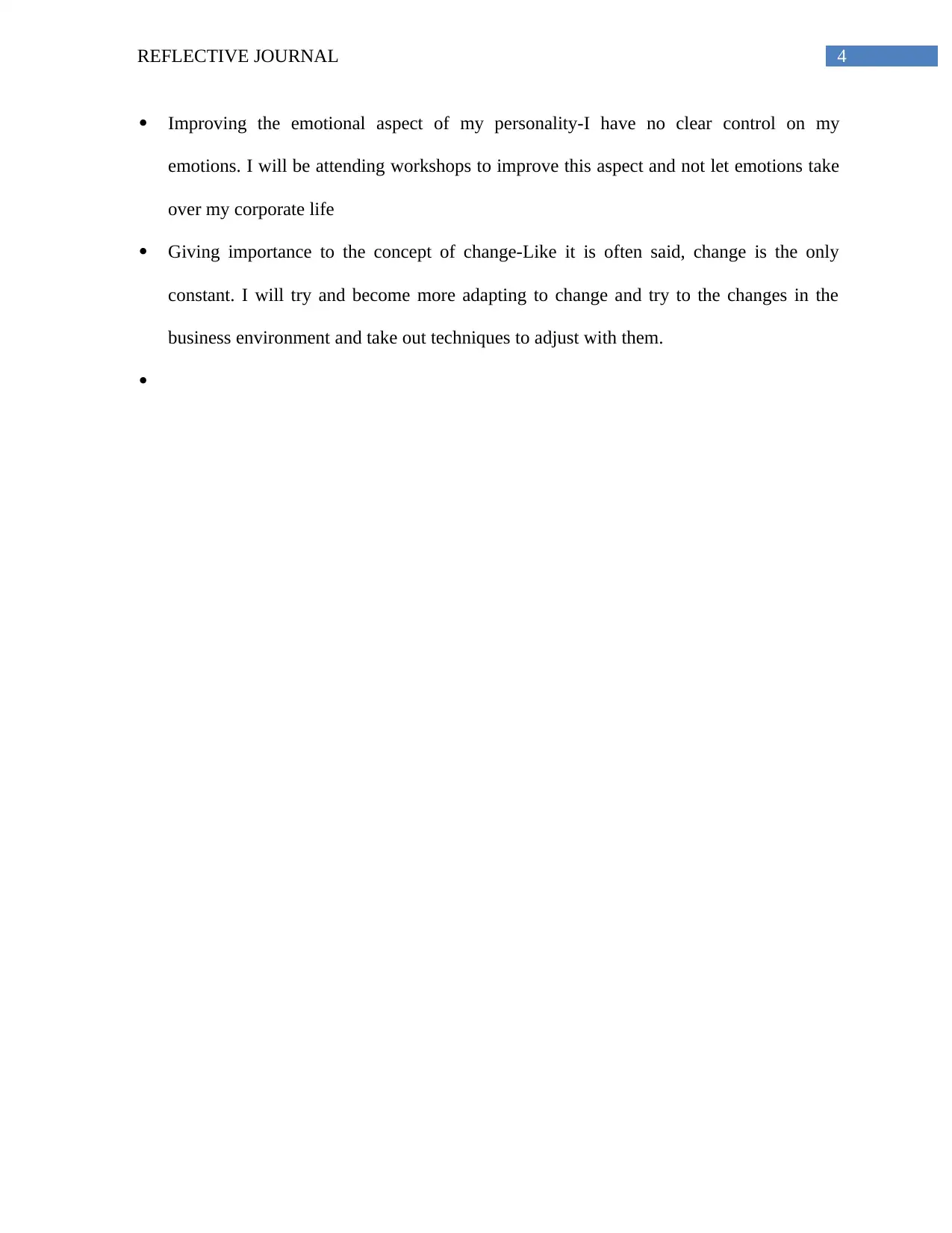
4REFLECTIVE JOURNAL
Improving the emotional aspect of my personality-I have no clear control on my
emotions. I will be attending workshops to improve this aspect and not let emotions take
over my corporate life
Giving importance to the concept of change-Like it is often said, change is the only
constant. I will try and become more adapting to change and try to the changes in the
business environment and take out techniques to adjust with them.
Improving the emotional aspect of my personality-I have no clear control on my
emotions. I will be attending workshops to improve this aspect and not let emotions take
over my corporate life
Giving importance to the concept of change-Like it is often said, change is the only
constant. I will try and become more adapting to change and try to the changes in the
business environment and take out techniques to adjust with them.
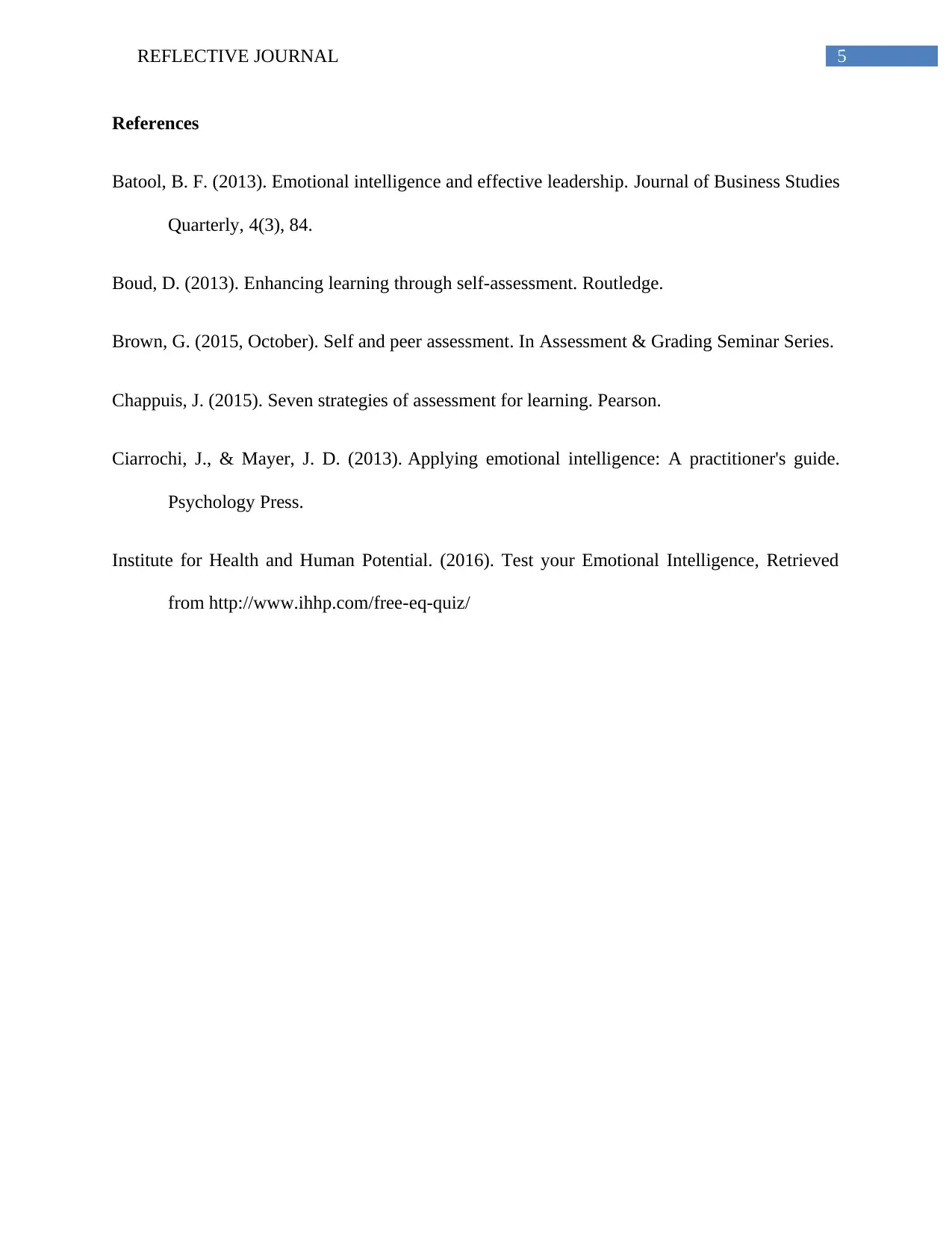
5REFLECTIVE JOURNAL
References
Batool, B. F. (2013). Emotional intelligence and effective leadership. Journal of Business Studies
Quarterly, 4(3), 84.
Boud, D. (2013). Enhancing learning through self-assessment. Routledge.
Brown, G. (2015, October). Self and peer assessment. In Assessment & Grading Seminar Series.
Chappuis, J. (2015). Seven strategies of assessment for learning. Pearson.
Ciarrochi, J., & Mayer, J. D. (2013). Applying emotional intelligence: A practitioner's guide.
Psychology Press.
Institute for Health and Human Potential. (2016). Test your Emotional Intelligence, Retrieved
from http://www.ihhp.com/free-eq-quiz/
References
Batool, B. F. (2013). Emotional intelligence and effective leadership. Journal of Business Studies
Quarterly, 4(3), 84.
Boud, D. (2013). Enhancing learning through self-assessment. Routledge.
Brown, G. (2015, October). Self and peer assessment. In Assessment & Grading Seminar Series.
Chappuis, J. (2015). Seven strategies of assessment for learning. Pearson.
Ciarrochi, J., & Mayer, J. D. (2013). Applying emotional intelligence: A practitioner's guide.
Psychology Press.
Institute for Health and Human Potential. (2016). Test your Emotional Intelligence, Retrieved
from http://www.ihhp.com/free-eq-quiz/
⊘ This is a preview!⊘
Do you want full access?
Subscribe today to unlock all pages.

Trusted by 1+ million students worldwide
1 out of 6
Related Documents
Your All-in-One AI-Powered Toolkit for Academic Success.
+13062052269
info@desklib.com
Available 24*7 on WhatsApp / Email
![[object Object]](/_next/static/media/star-bottom.7253800d.svg)
Unlock your academic potential
Copyright © 2020–2026 A2Z Services. All Rights Reserved. Developed and managed by ZUCOL.




